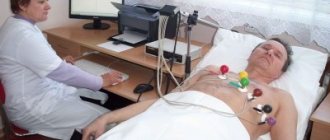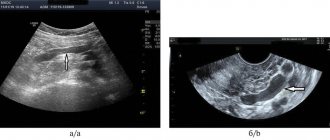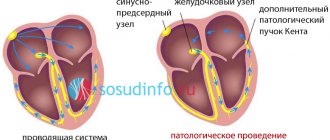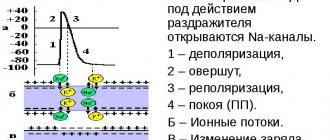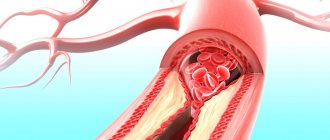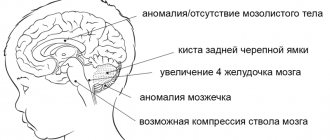Antiphospholipid syndrome (APS) is an autoimmune process of non-inflammatory origin.
During this process, immune cells produce antibodies aimed at destroying phospholipids - structural formations of vascular and nerve cells, as well as platelet membranes. Of particular danger are complications of antiphospholipid syndrome in pregnant women - stillbirth, premature birth, miscarriages, severe preeclampsia. To prevent this, even at the stage of preparation for pregnancy, the necessary diagnostics must be carried out, acquired or hereditary thrombophilia must be excluded through a blood test.
There are the following types of this pathology:
- catastrophic APS - thrombus formation in various organs in a short period of time (up to seven hours);
- primary – without manifestations of lupus erythematosus or concomitant infectious diseases;
- secondary – against the background of systemic lupus;
- syndrome without specific antibodies;
- APS, manifested by symptoms characteristic of other forms of thrombophilia.
Types of APS caused by the presence or absence of antiphospholipid antibodies:
- seropositive form - in addition to specific antibodies, a lupus anticoagulant was detected in the blood;
- seronegative form – absence of lupus anticoagulant, absence of antibodies to cardiolipin.
Diagnosis of antiphospholipid syndrome and its form is possible only in a modern laboratory equipped with highly sensitive technical equipment and high-quality reagents.
What is AFS?
APS is an autoimmune condition when antibodies to phospholipid complexes present in a variety of human organs begin to attack the tissues of their own body, because they perceive them as foreign and, as a result, try to resist an imaginary threat.
Despite the fact that theoretically any system can be affected, most often APS causes thrombosis (both arterial and venous), resulting in the development of such dangerous pathologies as thromboembolism, stroke and heart attack. In addition, the syndrome provokes serious complications during pregnancy.
It should be immediately noted that the production of antibodies to phospholipids itself cannot cause thrombosis. A certain event is necessary that will become a factor triggering the activation of the body’s immune forces. What could it be? For example, pregnancy, injury and stress.
Why us?
- Ultra-modern equipment. The qualifications of our specialists, expert equipment and modern techniques allow us to timely and accurately diagnose APS.
- Consultation of related specialists. The patient is examined by a council of doctors, this especially applies to pregnant women.
- Comfortable conditions. Our rheumatologists devote maximum time to each client. All services are provided in one building in the center of Moscow, which saves effort and time.
- Innovation. The use of high-tech treatment methods ensures the success of therapy.
Use the full potential of modern medicine to maintain your own health and give life to your child - contact a rheumatologist at the Yauza Clinical Hospital.
You can see prices for services
Types of API
Antiphospholipid syndrome is divided into primary and secondary. The clinical manifestations of both forms are the same - thrombosis of various locations, miscarriage, obstetric complications (fetal growth restriction, preeclampsia, placental abruption). The only difference is the presence or absence of a background disease that could cause the appearance of APS.
- Primary antiphospholipid syndrome
Occurs in patients without concomitant autoimmune pathology, cancer, or infectious processes. In other words, there is no obvious reason for the production of antiphospholipid antibodies.
- Secondary antiphospholipid syndrome
“Lays on” the patient’s existing concomitant pathology:
- Secondary antiphospholipid syndrome against the background of autoimmune pathological conditions: rheumatoid arthritis, systemic lupus erythematosus, systemic scleroderma, ulcerative colitis, autoimmune thyroiditis, etc.
- Antiphospholipid syndrome occurring against the background of malignant pathology (carcinoma, thymoma, tumors of the lymphatic system).
- APS, which arose against the background of infectious and inflammatory processes, as well as infectious and immunological pathology (HIV, glomerulonephritis, bronchial asthma and others).
- APS that arose against the background of systemic pathologies, such as chronic renal or liver failure.
Criteria for antiphospholipid syndrome
To make a diagnosis of “Definite antiphospholipid syndrome”, at least one clinical and one laboratory criterion must be present simultaneously:
1. Clinical criteria:
- Thrombosis of any location. This may be venous thrombosis (affecting the veins of the lower or upper extremities, thrombosis of the venous sinuses of the brain); arterial thrombosis (in the vessels of the extremities, the arteries of the heart - myocardial infarction, the arteries of the brain - ischemic stroke, the vessels of the abdominal cavity - mesenteric thrombosis, thrombosis of the renal arteries, etc.), thrombosis of the retinal vessels, as well as thrombotic lesions of the microvascular bed - for example, subcutaneous diffuse thrombosis, which manifests itself as a reticular pattern on the skin (livedo reticularis).
- 3 or more consecutive losses of a morphologically normal fetus before 10 weeks of gestation. If a chromosomal pathology is detected in a dead fetus, such a case of pregnancy loss is not taken into account as a criterion for APS.
- At least one loss of a morphologically normal fetus during pregnancy more than 10 weeks (antenatal death, late miscarriage).
- Premature birth before 34 weeks of pregnancy due to placental abruption, severe preeclampsia, placental insufficiency.
2. Laboratory criteria:
- positive blood test for lupus anticoagulant,
- antibodies to cardiolipin IgG and/or IgM, determined by ELISA, in a titer of 40 U/ml and above (with the laboratory norm not exceeding 20 U/l),
- antibodies to beta-2-glycoprotein IgG and/or IgM, determined by ELISA, in a titer of 40 U/ml (with the laboratory norm not exceeding 20 U/ml)
Important
: The laboratory criterion is considered met if positive antibodies are detected at least twice with an interval of at least 12 weeks between tests, but not more than 5 years.
In addition, the diagnosis of APS is not considered confirmed if more than 5 years have passed between clinical manifestations (thrombosis or pregnancy loss) and a positive laboratory test.
Probable antiphospholipid syndrome
If the patient has antiphospholipid antibodies, but collectively the criteria for definite APS are not met, a diagnosis of “probable APS” can be formulated. This happens, for example, with one or two fetal losses for up to 10 weeks and the presence of antiphospholipid antibodies; in case of inconsistent fetal losses (miscarriage, then childbirth, then two more miscarriages), or if, for example, the pregnancy was complicated by preeclampsia or placental abruption, but the birth occurred later than 34 weeks, and so on.
Also, the diagnosis of “probable APS” can be established when laboratory criteria are not fully met: the antibody titer does not reach the required 40 U/ml, or positive antibody tests are performed at intervals of less than 12 weeks, and so on.
Clinical picture
The most common and specific signs of antiphospholipid syndrome are:
- Arterial and/or venous thrombosis : the deep veins of the lower extremities often affect. As for the arterial bed, intracerebral vessels become targets.
- Obstetric pathology: fetal loss in the second or third trimester of pregnancy, late gestosis, pre- and eclampsia, intrauterine growth retardation.
- Damage to the central nervous system is accompanied by the development of ischemic attacks, strokes, epileptic seizures, chorea, and hearing loss.
- Unreasonable headaches: can manifest as migraine attacks or persistent and untreatable pain.
- Myocardial dysfunction: the patient is diagnosed with a heart attack (in the absence of atherosclerosis), valve damage, ischemic cardiomyopathy, pulmonary or arterial hypertension.
- Thrombocytopenia: platelet count varies in the range of 70-100*109/l.
APS also affects the urinary system (renal failure), liver, gastrointestinal tract, musculoskeletal system (bone necrosis), and skin (hemorrhages and ulcers appear).
Symptoms of antiphospholipid symptom
The doctor may be concerned about episodes in the patient’s past, such as:
- frozen pregnancies for a period of 10 weeks or more (even one such case is a reason for examination for the presence of APS);
- premature birth before 34 weeks, if severe forms of preeclampsia or fetoplacental insufficiency were detected during pregnancy;
- miscarriages (3 or more) in the early stages (up to 10 weeks), if the reasons for this could not be found;
- hypoxia (a condition caused by insufficient oxygen supply) and delayed fetal development;
- premature detachment of a normally located placenta.
Also at risk are women who have previously developed venous or arterial thrombosis during pregnancy, while taking oral contraceptives, or after giving birth.
References
- Guyton, A.K., Hall, J. Medical physiology / ed. IN AND. Kobrina. - M.: Logosphere, 2008. - 1296 p.
- Internal diseases in 2 volumes: textbook / ed. ON THE. Mukhina, V.S. Moiseeva, A.I. Martynova, 2010. - 1264 p.
- Secrets of rheumatology. - St. Petersburg: BINOM Publishing House, 1999. - 768 p.
- Reshetnyak, T.M. Antiphospholipid syndrome: diagnosis and clinical manifestations (lecture). Scientific and practical rheumatology, 2014. - No. 1.
- Federal clinical guidelines. Laboratory diagnosis of rheumatic diseases, 2014. - 12 p.
- Makarenko, E.V. Antiphospholipid syndrome. Problems of health and ecology, 2021. - No. 4 (54).
- Miyakis, S., Lockshin, M., Atsumi, T. et al. International consensus statement on an update of the classification criteria for definite antiphospholipid syndrome (APS). J ThrombHaemost, 2006. - Vol. 4(2). - P. 295-306.
APS during pregnancy
To prevent the development of dangerous complications, the doctor prescribes treatment from the very beginning of pregnancy.
If there are appropriate indications, the specialist may prescribe anticoagulants (drugs that reduce blood viscosity) and antiplatelet agents (substances that prevent red blood cells and platelets from sticking together).
Additionally, it is recommended to take B vitamins (including folic acid) and magnesium.
If a pregnant woman suffers from APS, she develops progesterone deficiency, so from the very beginning of pregnancy the doctor prescribes progesterone drugs.
Pregnancy management should be carried out under the supervision of an experienced hemostasiologist. Careful monitoring of the condition of the expectant mother and baby is necessary, as well as adjustment of the dosage of drugs based on research results. In the absence of adequate treatment, the likelihood of a successful pregnancy outcome is very low. If therapy is started in a timely manner, the chances increase markedly.
Treatment
After a thorough clinical examination, interpretation of laboratory data and medical history, a rheumatologist at the Yauza Clinical Hospital develops an individual treatment regimen for APS for each patient. Its components may be:
- indirect anticoagulants and antiplatelet agents;
- glucocorticoids;
- immunosuppressants;
- aminocholines;
- selective NSAIDs;
- immunoglobulins;
- complexes of vitamins and microelements.
Extracorporeal hemocorrection in the treatment of antiphospholipid syndrome
To reduce the amount of autoantibodies in the patient’s blood, increase the body’s sensitivity to drug therapy, and reduce the likelihood of developing side effects of drugs, our specialists use an innovative method for treating APS - extracorporeal hemocorrection. The following EG methods are used:
- cryoapheresis;
- cascade plasma filtration;
- immunosorption;
- high-volume plasma exchange;
- extracorporeal pharmacotherapy;
- photopheresis
The use of extracorporeal technologies in the treatment of APS helps to stop the autoimmune process, alleviate the course of the disease, as well as the onset of pregnancy and its favorable gestation in almost 90% of cases.
In addition, the course of hemocorrection in 100% of cases normalizes blood clotting ability, which eliminates the increased risk of thrombosis and thromboembolism characteristic of APS.
Diet
There is no special diet. However, with increased cholesterol and the risk of cardiovascular diseases and blood clots, patients should limit animal fats, carbohydrates, and salt. When treated with Warfarin, the diet should not contain an increased amount of vitamin K , which contains leafy vegetables, green tea, white cabbage, cauliflower, Brussels sprouts, broccoli, wheat bran, pumpkin, avocado, dairy products, spinach, carrots, currants.
Forecast
The course of this disease and the severity of thrombotic complications cannot be predicted. Unfavorable in terms of mortality are arterial thrombosis , recurrent thrombosis and thrombocytopenia . The prognosis still depends on how timely treatment is started, which the patient must strictly follow (sometimes for life). Mortality is associated with the development of stroke , heart attack , pulmonary hypertension , endocarditis , nephropathy , pulmonary embolism , and gangrene of the extremities .
If we consider catastrophic APS, the prognosis is unfavorable. Death occurs in half of patients and is caused by heart failure , myocardial infarction , respiratory distress syndrome and pulmonary failure . In the presence of antiphospholipid syndrome in patients with lupus erythematosus, the prognosis is also not favorable, since the survival rate of such patients is reduced.
Symptoms and complications of antiphospholytic syndrome
The main and most dangerous clinical manifestation of antiphospholytic syndrome is recurrent thrombosis. Most often, venous thrombosis develops, which are localized in the deep veins of the legs. This is associated with the risk of developing thromboembolism of the branches of the pulmonary artery. There are frequent cases of thrombosis of the veins of the liver and kidneys. Thrombotic lesions of the subclavian, portal, inferior vena cava, cerebral vessels, retinal veins and arteries, various parts of the aorta, and large vessels of the lower extremities may occur.
The following clinical manifestations of arterial thrombosis are distinguished:
- Peripheral gangrene;
- Blindness;
- Aortic arch syndrome;
- Cerebral circulation disorders.
The risk of thrombotic complications increases with the course of pregnancy and the postpartum period. Antiphospholipid syndrome leads to non-developing pregnancy, intrauterine growth retardation, and fetal death in the second and third trimesters. In the first trimester of pregnancy, antiphospholipid antibodies have a direct damaging effect on the fetal egg. Subsequently, the pregnancy is terminated spontaneously.
From the early stages of pregnancy, the functional activity of platelets increases, and the hormonal and protein-synthesizing functions of the placenta decrease. In the absence of appropriate treatment, the activity of the blood coagulation system increases. Thrombosis occurs in the vessels of the placenta, placental insufficiency develops, chronic hypoxia and the fetus may die due to lack of oxygen.
Prevention
Prevention includes:
- Control of the disease against which APS develops.
- Timely treatment of infectious complications.
- Impact on risk factors for thrombosis (high cholesterol, hypertension).
- Preparing women suffering from APS before pregnancy. This preparation includes the following treatment measures over 3 months: several sessions of plasmapheresis, taking antiplatelet agents (aspirin) for increased platelet function. If a woman receives warfarin, she is switched to low molecular weight heparins. In women, concomitant diseases are identified and treated, and foci of infection are sanitized. A woman should take vitamins with folic acid (0.8-1 mg per day), and if hyperhomocysteinemia is detected, the dose is increased to 5-6 mg. Taking vitamins B6, B1, B12 is also indicated. If the luteal phase is insufficient, progesterone .
- Women with recurrent miscarriage undergo HLA typing and karyotyping to identify various forms of thrombophilia.
Sources
- Htut TW., Milne D., Khan MM., Watson HG. Outcomes in patients with nontriple antiphospholipid syndrome (APS) anticoagulated with rivaroxaban. // Int J Lab Hematol - 2021 - Vol - NNULL - p.; PMID:33470532
- Cheng C., Cheng GY., Denas G., Pengo V. Arterial thrombosis in antiphospholipid syndrome (APS): Clinical approach and treatment. A systematic review. // Blood Rev - 2021 - Vol - NNULL - p.100788; PMID:33341301
- Vomero M., Finucci A., Barbati C., Colasanti T., Ceccarelli F., Novelli L., Massaro L., Truglia S., Pensa C., Mauro FR., Foà R., Valesini G., Conti F. ., Alessandri C. Increased eryptosis in patients with primary antiphospholipid syndrome (APS): a new actor in the pathogenesis of APS. // Clin Exp Rheumatol - 2021 - Vol - NNULL - p.; PMID:33124577
- Franco AMM., Medina FMC., Balbi GGM., Levy RA., Signorelli F. Ophthalmologic manifestations in primary antiphospholipid syndrome patients: A cross-sectional analysis of a primary antiphospholipid syndrome cohort (APS-Rio) and systematic review of the literature. // Lupus - 2021 - Vol29 - N12 - p.1528-1543; PMID:32814509
- Riancho-Zarrabeitia L., Martínez-Taboada V., Rúa-Figueroa I., Alonso F., Galindo-Izquierdo M., Ovalles J., Olivé-Marqués A., Fernández-Nebro A., Calvo-Alén J., Menor-Almagro R., Tomero-Muriel E., Uriarte-Isacelaya E., Botenau A., Andres M., Freire-González M., Santos Soler G., Ruiz-Lucea E., Ibáñez-Barceló M., Castellví I., Galisteo C., Quevedo Vila V., Raya E., Narváez-García J., Expósito L., Hernández-Beriaín JA., Horcada L., Aurrecoechea E., Pego-Reigosa JM. Antiphospholipid syndrome (APS) in patients with systemic lupus erythematosus (SLE) implies a more severe disease with more damage accrual and higher mortality. // Lupus - 2021 - Vol29 - N12 - p.1556-1565; PMID:32807021
- Uludağ Ö., Bektaş M., Çene E., Sezer M., Şahinkaya Y., Gül A., Inanç M., Öcal L., Artim-Esen B. Validation of the adjusted global antiphospholipid syndrome score in a single center cohort of APS patients from Turkey. // J Thromb Thrombolysis - 2021 - Vol51 - N2 - p.466-474; PMID:32588289
- Balbi GGM., Pacheco MS., Monticielo OA., Funke A., Danowski A., Santiago MB., Staub HL., Rêgo J., de Andrade DCO. Antiphospholipid Syndrome Committee of the Brazilian Society of Rheumatology position statement on the use of direct oral anticoagulants (DOACs) in antiphospholipid syndrome (APS). // Adv Rheumatol - 2021 - Vol60 - N1 - p.29; PMID:32460902
- Kotyla PJ., Islam MA. MicroRNA (miRNA): A New Dimension in the Pathogenesis of Antiphospholipid Syndrome (APS). // Int J Mol Sci - 2020 - Vol21 - N6 - p.; PMID:32197340
- Alijotas-Reig J., Esteve-Valverde E., Ferrer-Oliveras R., Sáez-Comet L., Lefkou E., Mekinian A., Belizna C., Ruffatti A., Hoxha A., Tincani A., Nalli C. ., Marozio L., Maina A., Espinosa G., Ríos-Garcés R., Cervera R., Carolis S., Monteleone G., Latino O., Udry S., LLurba E., Garrido-Gimenez C., Trespidi L., Gerosa M., Chighizola CB., Rovere-Querini P., Canti V., Mayer-Pickel K., Tabacco S., Arnau A., Trapé J., Ruiz-Hidalgo D., Sos L., Farran-Codina I. Comparative study of obstetric antiphospholipid syndrome (OAPS) and non-criteria obstetric APS (NC-OAPS): report of 1640 cases from the EUROAPS registry. // Rheumatology (Oxford) - 2020 - Vol59 - N6 - p.1306-1314; PMID:31580459
- Ahuja A., Tyagi S., Pati HP., Saxena R., Somasundaram V., Manivannan P., Tripathi P., Chandra D. Utility of Lupus Anticoagulant Assays (APTT-LA, KCT, DPT and DRVVT) in Detection of Antiphospholipid Syndrome (APS) in High Risk Pregnancy Cases. // Indian J Hematol Blood Transfus - 2021 - Vol35 - N3 - p.478-484; PMID:31388260
Antiphospholipid antibodies in the blood - normal or pathological?
Sometimes the level of antiphospholipid antibodies can be elevated in a healthy person. In 12% of people, these antibodies are present in the blood, but they do not develop the disease. The older the person, the higher the levels of pathological immunoglobulins may be. There is also a possibility of a false-positive Wasserman reaction, for which the patient should be prepared. The main thing is not to panic and undergo a comprehensive diagnosis.
Video: APS and other thrombophilias in obstetrics:
Author of the article:
Volkov Dmitry Sergeevich |
Ph.D. surgeon, phlebologist Education: Moscow State Medical and Dental University (1996). In 2003, he received a diploma from the educational and scientific medical center for the administration of the President of the Russian Federation. Our authors
General information
Antiphospholipid syndrome (syn. Hughes syndrome, lupus antibody syndrome, antiphospholipid antibody syndrome) is a clinical and laboratory symptom complex associated with hypercoagulation , manifested by venous/arterial thrombosis, valvular heart disease , arterial hypertension , obstetric pathology of various forms (late gestosis, miscarriage , intrauterine growth retardation), skin lesions and thrombocytopenia , which are caused by the synthesis of antibodies to phospholipids (aPL): cardiolipins , to b2-glycoprotein I and lupus anticoagulant, to cofactor proteins (protein S, prothrombin, protein C, prostacyclin, annexin V) .
APS is based on the formation of high titer bimodal autoantibodies that actively interact with membrane negatively/neutrally charged phospholipids and associated glycoproteins. The main specificity of APS is its high angiotropism/thrombogenicity.
Depending on the immunogenicity/structure, a distinction is made between “neutral” phospholipids (phosphatidylethanolamine, phosphatidylcholine) and “negatively charged” (phosphatidylinositol, cardiolipin, phosphatidylserine). Antiphospholipid antibodies that react with phospholipids are predominantly lupus anticoagulant, beta2-glycoprotein-1, cardiolipins and cofactor-dependent proteins.
Antiphospholipid antibodies are capable of influencing many processes that form the basis of the processes of regulation of hemostasis. By interacting with phospholipids of neutrophils, platelets, and cell membranes of the vascular endothelium, antibodies cause hemostasis disorders, manifested by a tendency to hypercoagulation.
The clinical significance of aPL is determined by the relationship between their presence/level in the blood and the development of specific characteristic symptoms. For example, manifestations of APS are observed in only 30-35% of individuals with positive lupus anticoagulant and only in 40-50% of individuals with moderate/high levels of lupus anticoagulant.
There are no reliable statistical data on the true prevalence of APS in the human population. It has been established that in the blood serum, high titers of antibodies to phospholipids are found in 0.2% of healthy individuals, and a slight increase in the level of AT occurs in 2-4% of individuals. Diseases associated with APS can affect both men and women (including children of different ages), but antiphospholipid syndrome is 5-7 times more often diagnosed among women, mostly young (from 20 to 40 years old) and is much less common in older people. At the same time, there is an increase in the incidence of aPL in various autoimmune, inflammatory and infectious diseases, taking certain medications (psychotropic drugs/oral contraceptives), cancer, and in individuals with an immunogenetic predisposition to increased production of aPL. APS can be sporadic and hereditary in nature, in which inheritance occurs in an autosomal dominant manner.
The problem of antiphospholipid syndrome, manifested by multiple organ symptoms, is a multidisciplinary one, which is dealt with by rheumatologists, cardiologists, neurologists, hematologists, gynecologists, and obstetricians. The table below provides summarized data on the clinical manifestations of APS and their frequency of occurrence.
Since APS is characterized by multiple organ symptoms, as well as the impossibility of describing all clinical manifestations, we will consider only the most characteristic/frequent manifestations of APS in the context of venous/arterial thrombotic manifestations, often ending in vascular occlusion and obstetric/gynecological pathologies as a cause of termination of pregnancy.
Pathogenesis
The pathophysiological processes in the formation of antibodies to certain self-phospholipids have not yet been fully studied and are controversial. There are many theories trying to identify the mechanism/causes of coagulation disorders in APS - disruption of the mechanisms of cellular apoptosis , the production of antibodies against coagulation factors (proteins C and S, prothrombin, annexins), increased tropism of platelets to the vascular endothelium, etc. It also remains not fully understood the role of secondary risk factors in the development of APS (obesity, diabetes, hypertension, age, gender, etc.).
Antiphospholipid antibodies are represented by a large group of antibodies, but in practice, antibodies to cardiolipin (ACL)/lupus anticoagulant (LA) are of leading importance, which, when attached to platelets/endothelium of the vascular walls, enter into blood coagulation reactions, which leads to the development of thrombosis. There is also an assumption that antibodies have immune activity and can directly have a “toxic” effect on various tissues of the body.
It has been established that in order to trigger an autoimmune process, not only antibodies to phospholipids must be present in the body, but also cofactors, with which antibodies bind to form antigen-antibody complexes. Such cofactors include beta-2-glycoprotein-1, proteins C and S, prothrombin, etc., present in the serum of patients.
The process of producing antibodies to phospholipids is carried out due to endogenous/exogenous stimuli. The effect of exogenous stimuli (mainly infectious agents) is not an autoimmune process, is transient in nature and does not require treatment. And the production of antibodies when exposed to endogenous stimuli occurs with a violation of endothelial hemostasis . That is, the development of APS is based on various autoimmune reactions to phospholipid determinants, which causes coagulopathy of various localizations.
Phospholipids, being a universal component of mitochondria/cell membranes, are involved in the formation of the cytolemma of vascular endothelium, erythrocytes, platelets and nervous tissue cells. It is their wide representation in the human body that explains the extraordinary polymorphism/multisystem nature of the lesion, as well as the long-term persistent course and wide manifestations of APS symptoms.

